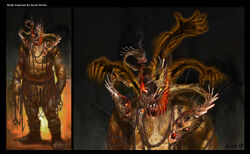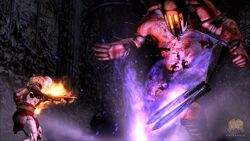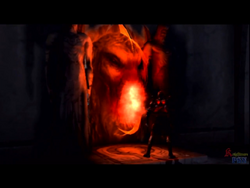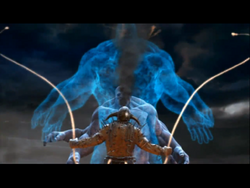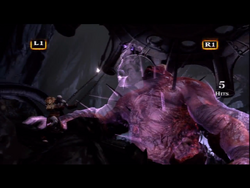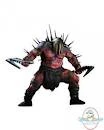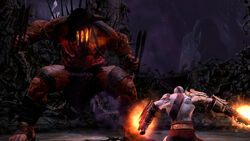| “ | Welcome, Spartan! Come in! Make yourself at home. This time, you won't be leaving. | ” |
–Hades. | ||
Template:Infobox godsHades was the god of the Underworld, wealth, and the dead. He is the brother of Zeus and Poseidon and a son of the Titans Cronos and Rhea. He is also a major antagonist in God of War III.
Greek Mythology
Hades was the ancient Greek god of the Underworld, but his name was shared with the abode of the dead.
In Greek mythology, Hades was the oldest child of Cronos and Rhea. According to myth, he and his brothers Zeus and Poseidon defeated the Titans in battle and took over rulership of the cosmos; ruling the underworld, air, and sea, respectively; the solid earth, the long province of Gaia, was available to all three concurrently.
He was also called "Plouton" (Greek: meaning "Rich One"), a name which the Romans Latinized as Pluto. The Romans would associate Hades/Pluto with their own chthonic gods, Dis Pater and Orcus. The corresponding Etruscan gods was Aita.
Symbols associated with him are the Helm of Darkness and the three-headed dog, Cerberus.
The term hades in Christian theology (and in the New Testament Greek) is parallel to Hebrew sheol (grave or dirt-pit), and refers to the abode of the dead. The Christian concept of hell is more akin to and communicated by the Greek concept of Tartarus, a deep, gloomy part of Hades used as a dungeon of torment and suffering.
In the God of War Series
The First Titanomachy
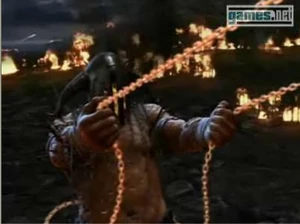
Hades during the Great War.
Hades appears in cut scenes in God of War II, depicting the Great War, when the Gods defeated the Titans. He is seen fighting and imprisoning Atlas alongside his brother, Poseidon. There is a statue of him in the Garden of the Gods along with Athena, Ares, Zeus, Helios, and Poseidon. At the end of the game he is seen with Poseidon, Helios and Hermes standing in front of Zeus, before the second Great War begins. Also when he's fighting Cronos, Atlas comes and uses a ground attack on Hades. Then Hades manages to take Atlas's soul within him.
Wager of the Gods
In the comics, Hades is seen in flashbacks competing in the wager of the Gods, a contest in which Gods choose various mortals as their champions, with the goal being the capture of the healing elixir known as Ambrosia. Hades chose Alrik, a warrior who sought to capture the Ambrosia in order to save his ill father, as his champion. After which, in fear that Kratos may best his champion, Hades sent a torrent of great fires from the sky onto Kratos' army. However, he was still unable to kill Kratos. After Alrik was defeated by Kratos and torn apart by Rocs, Hades revived him and sent him to destroy the Spartan who defied him. After being saved from death, Alrik then discovered that his beloved father had died, and so, the new Barbarian King vowed to exact vengeance onto Kratos.
Kratos' Tiring of Ares
In God of War: Ascension, Hades sent The Furies to capture Kratos and imprison him in a Titan-sized prison for the living damned, where he is tortured for months on end, driven insane, and constantly haunted by the visions of the night he lost everything dear to him.
Fueled by a desire and lust for revenge against Ares, along with a need to redeem himself among Hades to earn salvation, Kratos manages to break free of his imprisonment and sets out on a journey to defeat the Furies. If he can successfully defeat them he can sever all ties to Ares without consequence.
Persephone's Betrayal
In Chains of Olympus, one of the final challenges is called Challenge of Hades. Hades himself does not appear, although Kratos does enter his realm of dead, the Underworld. Hades does, however, play a background role, as husband to Persephone, the main antagonist of the game. Persephone doesn't love him, but is forced to remain in his dark realm. Because of this, she had chosen to end both her life and that of the gods by freeing Atlas and commanding him to destroy the Pillar of the World.
Aiding Kratos
In God of War, he manifests in Pandora's Temple in a translucent form, like the other gods, and gives Kratos a magic called the Army of Hades. Only his fiery, demonic face is seen. There is also a giant statue of him in the section of the Temple called The Challenge of Hades, as well as another statue of Hades alongside Zeus and Poseidon in Pandora's Box's Elevator.
Moving in Shadows
While Hades doesn't appear in Betrayal, he is, again, a background character. When Kratos starts chasing the mysterious Assassin, the Undead Legionnaires and Cerberus appear from Underworld to stop him. Kratos wondered why Hades sent these beasts to attack him, speculating that Hades is the one who is plotting to ruin Kratos' relationship with the other gods. This would have made sense, since Hades already had a legitimate reason to hate Kratos for the death of his wife Persephone.
The Second Titanomachy
| “ | I knew you would be back Spartan. Did you miss me? | ” |
–Hades | ||
Hades is first seen amongst the congregation of Gods on Mt. Olympus, dropping down to join Hermes and Helios in battle against the Titans scaling the mountain. He is briefly seen dislodging Oceanus from the mountain after Kratos disabled one of the Leviathans attacking Gaia.
Kratos encounters Hades personally in the Underworld, who seeks to prevent him from escaping again. After first entering, Hades periodically comments Kratos' actions, often in a sarcastic, humorous or taunting tone of voice. As soon as Kratos enters his Palace, Hades takes a more hostile stand, claiming he senses "some bad blood" between them. Before the battle, Hades reminds Kratos how he has wronged him in the past, by killing Athena, Poseidon, and especially Persephone. Hades then threatens, "I will see you suffer as I have suffered! Your soul is mine!".
Emerging from complete darkness, Hades immediately attempts to steal Kratos' soul, but fails. An intense battle ensues, during which Kratos and Hades do battle with their respective chain blades. Eventually, the blades become entangled, and Hades attempted to pull Kratos into the River Styx. Eventually, Kratos gains the upper hand and uses both weapons to form a noose around Hades' neck, repeatedly slamming his head into the ceiling and knocking him into the River Styx. From this, Kratos obtains the Claws of Hades. Eventually, a significantly bigger Hades bursts out of the river, no longer sporting his helmet, revealing a deformed, devilish, cracked skull. Kratos finally manages to rip out his soul, using his own Claws. As Hades' rule of the Underworld lifts, the tormented souls of the Styx swarm over Hades, dragging him into the depths of the river. Kratos, in possession of Hades' soul, is now free to traverse the River Styx unharmed. After diving into the river, the godly possession, Hades' helmet, can be retrieved at the bottom, near the point of entry. It then becomes available during Bonus Play. Before leaving, Hades' corpse can be seen at the bottom of the Styx, mutilated, as the tormented souls tore a passage through his gut to escape the river. Swimming through Hades' now open torso, Kratos follows them and returns to Hephaestus' forge.
Powers and Abilities
Hades was one of the most powerful gods of them all, being the ruler of the underworld and one of the oldest of the gods, his power is rivaled only by Zeus, Kratos, and Poseidon.
- Immortality: Like all gods, Hades was immortal, and could not be slain by mortal means.
- Invulnability: Hades was invincible to certain forms of attacks, and able to take significant amounts of force, Kratos only managed to defeat him by ripping his own soul out of his body, While Kratos did have to destroy the peices of flesh he tore from Hades twice, lest the Ruler of the Underworld would keep recovering.
- Shapeshifting: Hades could also shapeshift, which he demonstrated during his battle with Kratos, as he increased his size throughout the battle, eventually growing to the size of a giant.
- Superhuman Strength: As a god, Hades has super strength, his strength is incredible, able to overpower titans with ease, and match Kratos in battle.
- Superhuman stamina :
- Superhuman durability:
- Necromancy: As the ruler of the Underworld, Hades had a good deal of control over the souls of the dead, to the degree where he was able to gift them to worthy mortals. While Kratos traversed the dangers of Pandora’s Temple, Hades gifted him with the souls of the Underworld to aid him in his journey. These souls are much stronger if they are summoned from the deepest depths of Tartarus. These souls can viciously maul Kratos’ enemies to death, or weaken them enough for him to finish them off.
- Pyrokinesis: In the comics he was also capable of launching fireballs, indicating his ability of Pyrokinesis, likewise when really hurt by Kratos during there battle, his realm would ignite with a burning inferno.
- Umbrakinesis: Hades was also able to manipulate shadow and darkness as he demonstrated in his fight with Kratos. Hades could breath dark energy from his mouth.
- Regeneration: Hades possessed regenative powers, such as when Kratos ripped a piece of his fleash out, he could heal himself simply by place the flesh back.
- Telekinesis: Hades posssesed telekinesis, although a seeminly weak varity, he was able to make the flesh Kratos tore out of him move back to him.
Hades also carried the Claws of Hades, duel hook-ended chain-blades with the power of tearing the souls from any living being, even a Titan. They are depicted as being a set of spiked chains with two hooks glowing purple at the end of each. Hades is "draped" in them, and they are embodied with his magic powers. Using the magic stored within the chains, Hades can pull out the soul of his enemies. By absorbing souls, they allow Hades to become stronger, something he even references whilst battling Kratos, as he taunts him by stating his soul will only make him stronger. These chains are extremely lethal weapons as they allow Hades to attack at short and long distances. Hades when he slams his claws on the ground he can spread the chains everywhere to instantly kill his enemies. They glow with a dark purplish aura indicating the number of souls that it has absorbed. By absorbing countless souls, the chains' attack power increases as well as the speed . Hades has the ability to summon legions of the undead as well as a wide array of undead beasts using the Claws' power. The chains were a very powerful part of Hades' arsenal, and with them he defeated many Titans in the War. Free from certain limitations the claws being so powerful even managing to rip the ground from his helmet.
Personality
| “ | I will see you suffer as I have suffered. Your soul is MINE! | ” |
–Hades. | ||
Unlike his brother Zeus and many of the other Gods of the series, Hades is mostly unconcerned with the affairs of the mortal realm, preferring to focus his energies on the Underworld. He is, however, quick to anger if someone crosses him or his family, which makes him an enemy of Kratos. As Kratos is traveling through his palace, Hades comments that there is bad blood between them, as Kratos had murdered his niece (Athena) and his brother (Poseidon), which cannot go unpunished. He also appeared to have deeply cared for Persephone, despite her words and treachery. Indeed, he has restored her remains and created a massive memorial to her. He doesn't, however, comment on the loss of his nephew Ares, indicating that Hades, much like the other gods, did not care much for Ares. This means that, surprisingly, Hades cared for his family.
Hades has a sinister and sadistic, mock-playful humor, evident in the way he taunts and intimidates Kratos throughout the Underworld. This is similar to the mythological Hades, who often gave out ironic punishments to particularly unfortunate souls. He also appears to be a masochist, as even when Kratos beats him senseless, he claims to enjoy the pain.
Gifts and Objects
- Army of Hades: Given to Kratos after defeating Pandora's Guardian.
- Shield of Hades: Used in Pandora's Temple, with the Shield of Zeus, to progress further into the temple.
- Claws of Hades: After Kratos bashes Hades' head through the ceiling, he takes away his claws, using them to extract his soul and exacting his revenge.
- Hades' Helm: Swimming down the River Styx to the very bottom at point of entry, and retrieving the Helm, will grant use of this Godly Possession in Bonus Play.
Trivia
- The most likely reason Hades' appearance changed drastically from God of War to God of War II is that the game developers may not have expected the series to pan out the way it did, and may not have planned out much beyond the first game. When fleshing out the entire storyline, they most likely wanted to give each God a look and personality unique to the God of War series, compared to the designs in the original God of War; another reason that his appearance changed can be put down to one simple fact - Hades is a god, and presumably he can change his appearance at will to suit his needs. This is proven between God of War II and God of War III: at the end of God of War II, he was smaller than his fellow gods and had greyer skin, while in God of War III, his skin was red and his size was equal to that of his brethren.
- Modern adaptations of Hades tend to portray him as corrupt, greedy, or evil, similar to the underworld gods of other mythologies or the Judeo-Christian Satan. In Greek mythology, however, Hades was not inherently evil, but was merely gained the unpopular position of being lord of the dead after drawing lots with his brothers, Zeus and Poseidon. Over time, however, living in the underworld made a recluse out of him, and ancient myths do not count him among the Twelve Olympians, as Hades spent most of his time away from Olympus tending to the dead. He was also portrayed as very strict, especially when it came to letting the living in, or the dead out, of his kingdom.
- The Evil from Pandora's box that infected Hades was most likely Hate; evidenced by his desire to have his revenge on Kratos for killing his family members.
- The same statue of Hades, in his demonic visage in God of War, appears in God of War III whilst Kratos is in the Underworld, and in God of War: Ghost of Sparta, in the Hades arena setting.
- Many confuse Hades with Thanatos, the personification of Death. Hades was the ruler and judge of the dead, but not the god of death itself.
- Hades was one of the few gods to remain faithful to their spouse. He, in fact, won Persephone over with gifts after having abducted her. She was only abducted as Demeter, her mother, did not agree to the marriage.
- During the fight in God of War III, Hades uses an attack similar to what Persephone did in Chains of Olympus, where they would conjure items from the ground; the only difference is that Persephone summoned light while Hades summoned chains.
- PlayStation All-Stars Battle Royale features Hades as a background character, where his domain is invaded by the Patapon army. He also interacts with the players fighting in the foreground.
- Hades is one of the mentors for God of War: Ascension multiplayer.
- His masochistic nature and his claims about pain are quite similar to Pinhead from the Hellraiser franchise. Other similarities are his weapons, the Claws of Hades, which are a like to Pinhead's hooks; the fact he can pull out someone's soul as contradiction to Pinhead famous quote: "I will tear your soul apart." The spikes on his back are similar to the spikes driven in Pinhead's head.
- Clancy Brown, the man who voiced Hades, is famous for his role as Mr. Krabs from SpongeBob SquarePants and Lex Luthor from Superman: The Animated Series.
- It is currently unknown why Hades gave Kratos the Army of Hades as he hated him for killing Persephone, it is possible he had put aside his grudge to help Kratos destroy Ares or that his feeling towards Kratos for killing Persephone were quite neutral, knowing the Spartan had no other choice, this only to be erased as the Evil Hatred infected him, amplifying his true feelings of hatred towards the latter.
- Because he is the oldest of his siblings Hades suffered longer inside of his father Cronos which would explain his grotesque appearance.
- Hades and Helios are the only major gods in all the games to not have any children.
Gallery
Video
thumb|left|200px|Kratos vs. Hades



